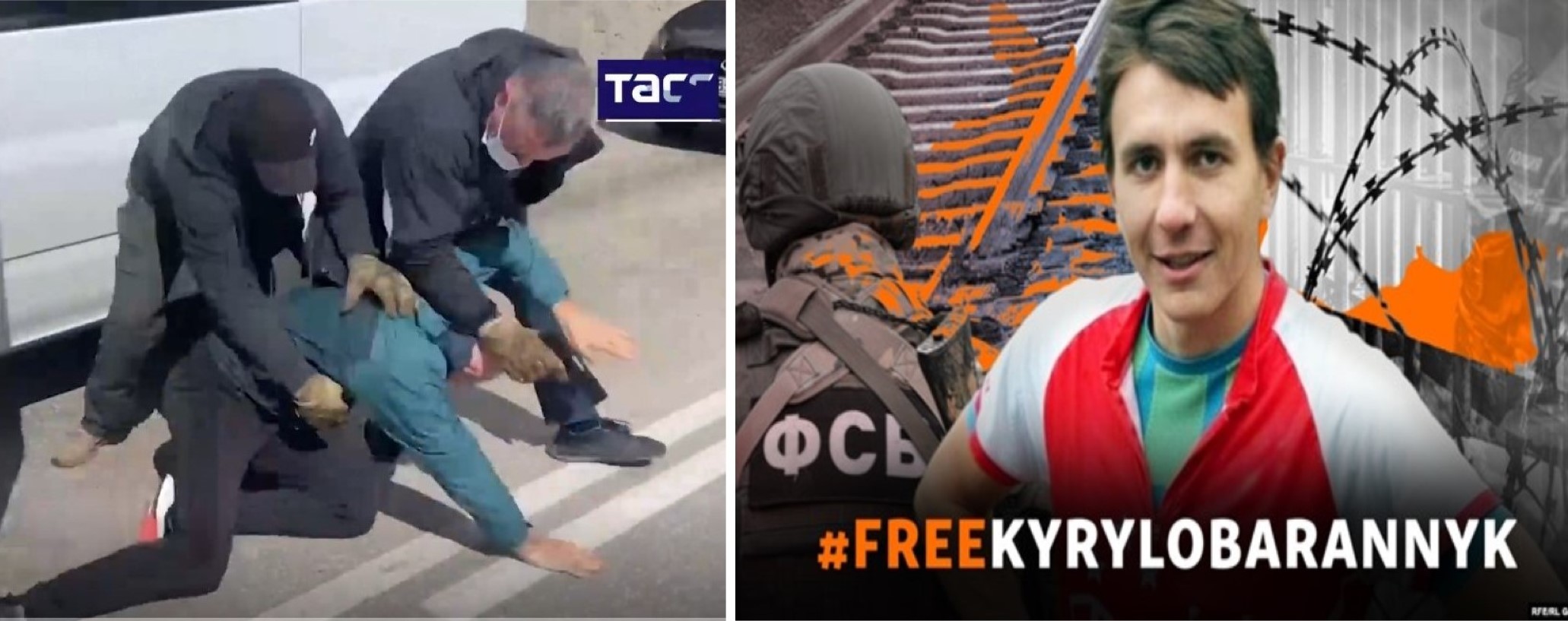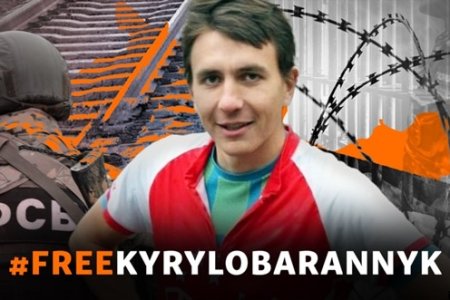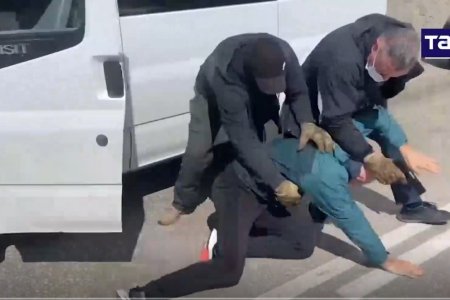
The ‘trial’ is about to begin in Rostov of eight Ukrainian men and women from occupied Crimea held in Russian captivity since May 2023. The charges appear suspiciously fluid and, judging by the account given by Ukrainian sportsman Kyrylo Barannyk, are very likely based on ‘confessions’ extracted through torture and threats against members of the Ukrainians’ families.
The preliminary hearing is scheduled for 2 May 2024 under presiding ‘judge’ Valery Sergeevich Opanasenko from the Southern District Military Court. The latter has been notorious for its politically motivated ‘trials’ of Crimean Tatar and other Ukrainian political prisoners since 2014, and there are, unfortunately, no grounds for believing that the five men and two women will receive a fair trial. Russia is in violation of international law through its application of its own legislation on occupied territory, and its forced deportation of Ukrainian nationals to the Russian Federation. The fact that the five men are all accused (among other charges) with ‘state treason’ (Article 275 of Russia’s criminal code) and must therefore be Russian citizens changes nothing since Russia has made it impossible to live, work and receive medical care without a Russian passport.
The eight Ukrainians are: Kyrylo Barannyk (b. 1998); Olha Kravchuk; Serhiy Kryvosheiin; Denys Petranov; Viktor Pidvalny; Serhiy Voinarovsky; Olena Voinarovska; and Ihor Zorin. The two women are facing only charges under Article 222.1 § 4 – possession, purchase, etc. of explosives by a group, however this charge alone can carry a sentence of up to 15 years’ imprisonment. The men face multiple charges under Articles 275 and 222.1; as well as Article 205 § 2 (carrying out or planning a terrorist act); Article 205.3 (training to commit terrorist activities) and 205.4 § 2 ‘organization of a terrorist society’. Barannyk, Petranov and Pidvalny are also charged with Article 226.1 (smuggling explosives, other dangerous substances). All six men could be sentenced to life imprisonment, despite serious grounds for doubting that any crimes were carried out, or even planned. The detailed allegations of torture made by Kyrylo Barannyk and the fact that he appears to be facing different charges from those that he ‘confessed to’ under torture only compound the doubts. The only information about the charges first announced on 3 May 2023 against the other Ukrainians, as well as against 52-year-old Kostiantyn Yevmenenko and 38-year-old Oleksandr Lytvynenko who are, for reasons that are unclear, being tried separately, have come from Russian propaganda media.
Kyrylo Barannyk
Most is known about Barannyk, in part because he is represented by an independent lawyer (Alexei Ladin). Not only was Barannyk not mentioned when the arrests were announced on 3 May 2023, but he was not then in captivity, being detained only on 30 May. Nor does it seem likely that he was seized as a result of the earlier detentions, as the original pretext and charges were quite different.
As reported, Barannyk had, as a teenager, won several Ukrainian championships in sports orienteering and was at an international youth competition in Turkey, gaining a gold medal for Ukraine, when Russia invaded Crimea. He appears to have had a firm pro-Ukrainian position, but remained in occupied Crimea, living with his mother, a pensioner. He was seized on 30 May and accused of involvement in an explosion on railway tracks on 23 February 2023. So, it should be said, were very many Ukrainians, especially Crimean Tatars, with at least one person threatened and coerced into signing effectively blank ‘confessions’. Via his lawyer, Barannyk was able to provide an account of the methods used to force him into providing false ‘confessions’. He explained that he had been taken, with a bag over his head, to the FSB building in Simferopol. There he had been subjected to torture, for example, by being forced into a chair, with his hands and feet bound with scotch tape, and electric currents attached to his fingers. Even after he apparently confessed to the damage to railway lines on 23 February, the FSB continued their torture. demanding that he also ‘admit to’ the explosion on the railway lines near the village of Chystenke (Simferopol raion) on 18 May. Barannyk asserts that there were two other occasions when he was subjected to such electric current torture – during the night from 5 to 6 June 2023, and from 9 to 10 June.
“The FSB officers forced me to admit to a crime that I hadn’t committed. At first, they tortured me with electric currents, connecting electric terminals to my fingers, toes, earlobes and buttocks. They threatened to fully rape me, and I took the threat seriously. Then they beat and kicked me around the torso and head, with this resulting, I believe, in a broken rib on my right side.”,
They also threatened to rape or kill his mother, or to kill him, claiming that he had tried to escape.
This is not the first time that a Ukrainian, taken prisoner and forced into ‘confessing’ to this or that crime, ends up charged with something else. In this case, there was no mention at all of Barannyk, nor any suggestion that there was another person who had not been identified.
‘Thwarted assassination attempt’
On 3 May 2023, Russian propaganda media reported that the FSB in occupied Crimea had “uncovered’ what was claimed to be an agent network of Ukraine’s Military Intelligence [HUR]. It was alleged that the FSB had thwarted plans by this purported network to assassinate the Russian-installed ‘head of Crimea’ Sergei Aksyonov, the ‘speaker of the Crimean parliament’ Vladimir Konstantinov and the Russian-installed ‘mayor of Yalta’ Yanina Pavlenko, “as well as terrorist attacks on transport infrastructure facilities” in Crimea. Six men with dual Ukrainian and Russian citizenship were said to have been detained: Serhiy Kryvosheiin; Oleksandr Lytvynenko; Viktor Pidvalny; Serhiy Voinarovsky; Kostiantyn Yevmenenko and Ihor Zorin. Denys Petranov was mentioned only by his surname, and was referred to as a citizen of both Ukraine and Bulgaria. He was said to have delivered the alleged explosive devices, concealed in hotplates to occupied Crimea. The FSB claimed to have discovered five bombs, ready for use; electric detonators; radio-controlled mechanisms and trackers. According to their version, they uncovered a channel, “organized by the Ukrainian Security Service”, or SBU, by which the explosive devices were smuggled in from Bulgaria, via Turkey and Georgia. A Ukrainian national Marina Matushchak was also accused of having organized the smuggling of these hotplates. She may well have been the woman shown on the FSB videos, however there was no indication of her status in ‘the case’. No mention was made of Olha Kravchuk and Olena Voinarovska.
The men were also claimed to have been planning to blow up parts of transport infrastructure, with the FSB mentioning the explosion on 23 February 2023. The latter is the only actual event that the Ukrainians in custody could have been involved in, with the rest of the charges linked with allegedly ‘thwarted’ plans.


